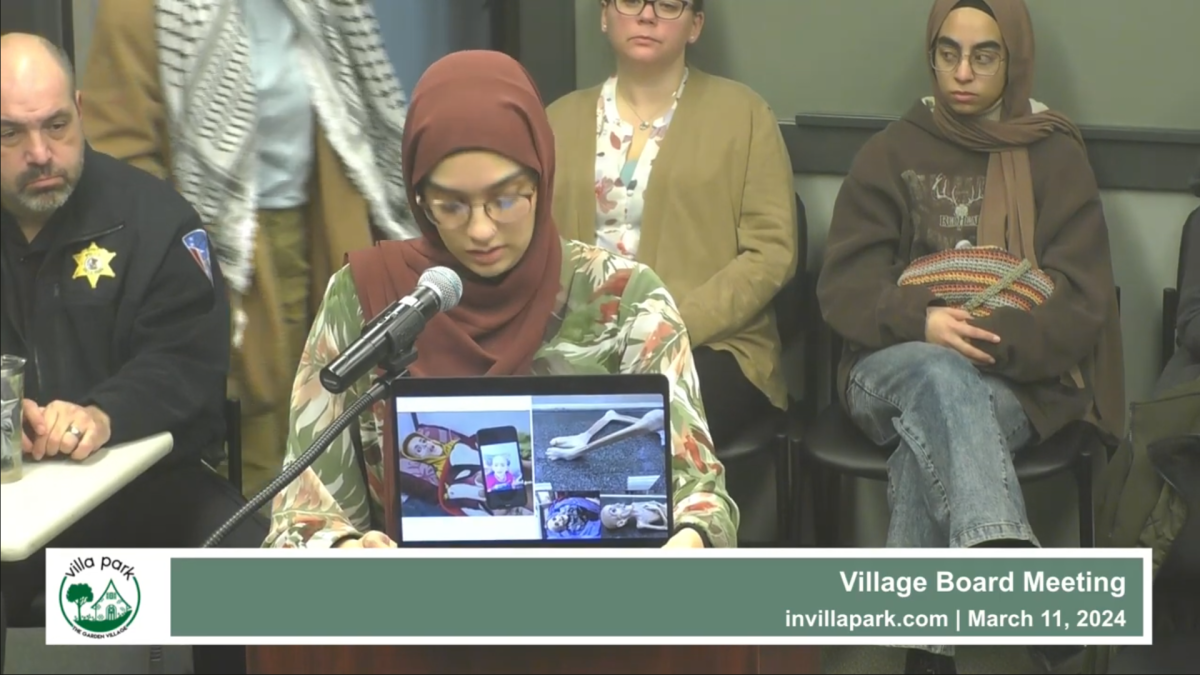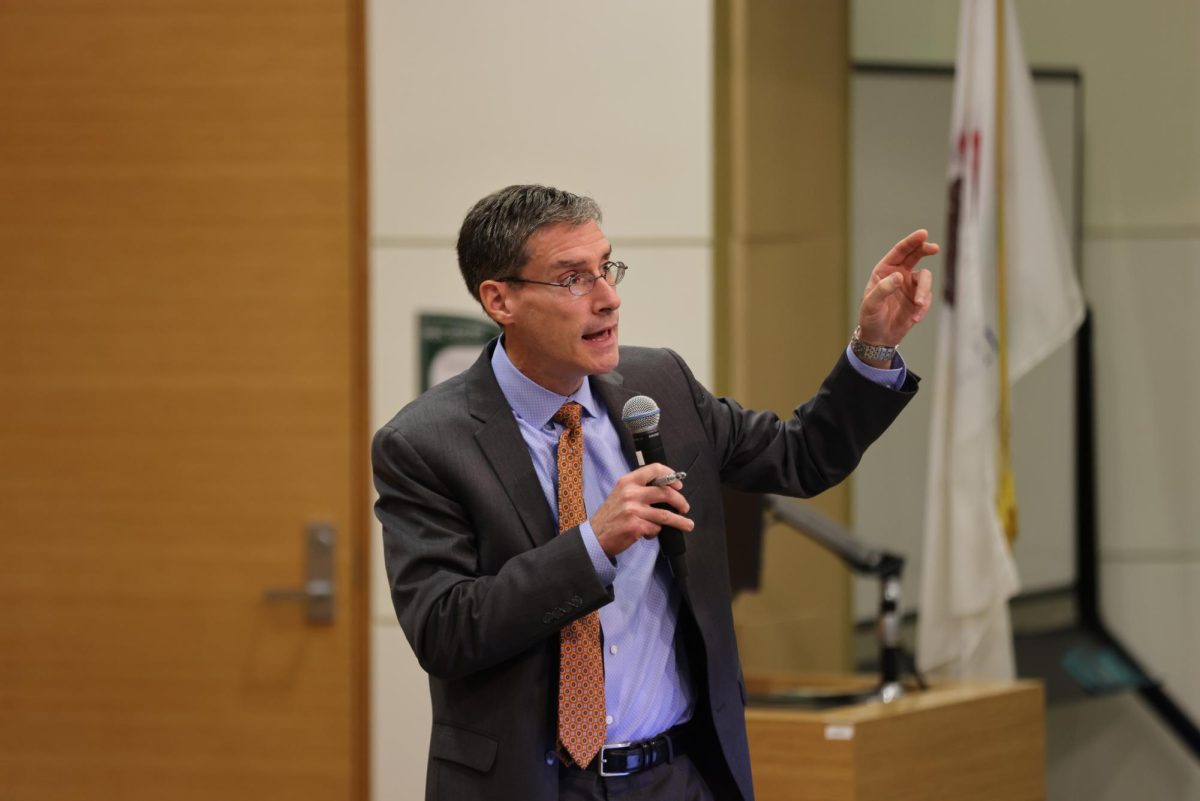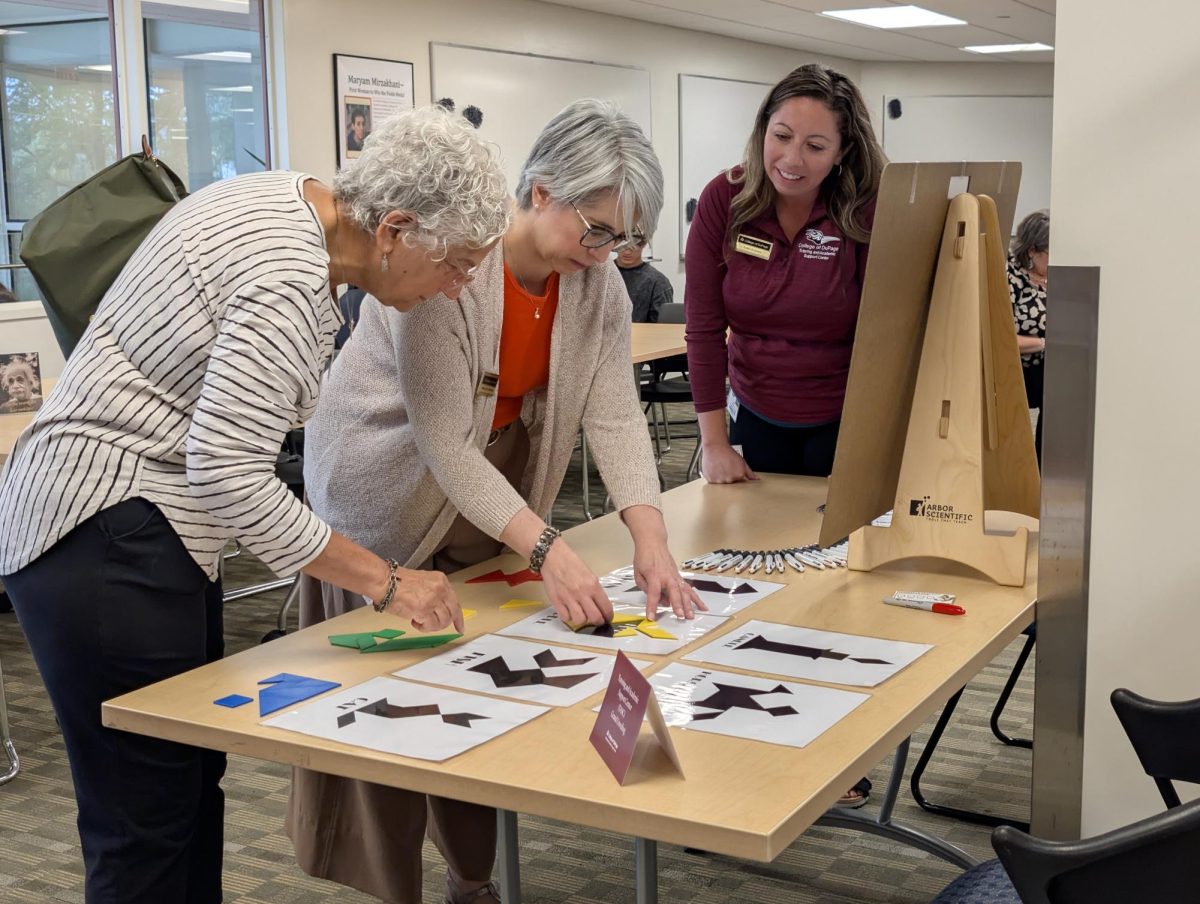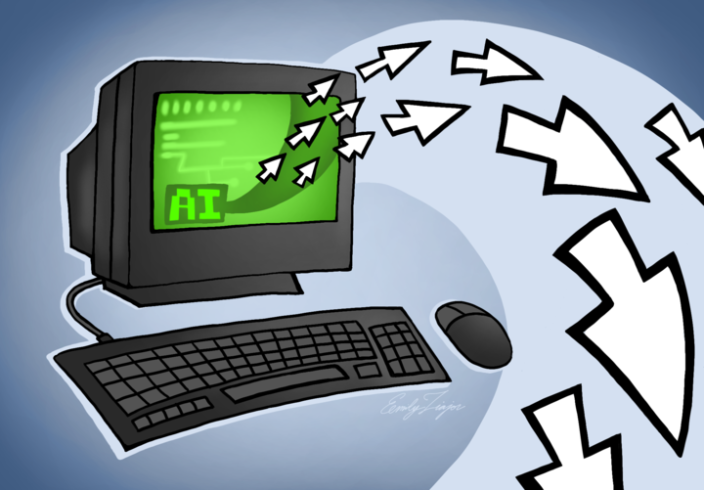A round of applause and hugs between neighbors filled the village board room in Batavia, Ill. on April 15 as it became the seventh Illinois municipality to pass a cease-fire resolution this year. Citizens have taken it into their own hands to advocate for a cease-fire as they are devastated by local impacts of the war between Israel and Palestine.
Wearing Palestinian keffiyeh scarves and t-shirts with slogans for peace, community members delivered impassioned speeches at their village meetings. In the city of Urbana, Ill., over 70 speakers supported the resolution. In Bridgeview, Ill., known for its large population of Palestinian-Americans, the resolution for “commitment in support of peace” was a sign of hope for those who came as refugees and continue to lose family members in Gaza.
With each passing day, the civilian death toll in the Gaza Strip mounts near 40,000 or more, raising global concerns over civilian protection and the possibility of genocide. The war began on Oct. 7 when 1,200 Israelis were killed and about 240 taken hostage in an attack by Hamas. Since then, worldwide rallies have called for an end to the war, the exchange of Israeli and Palestinian captives and an end to the illegal occupation of Palestine.
Many believe a cease-fire is the first step to fix this barrage of calamities.
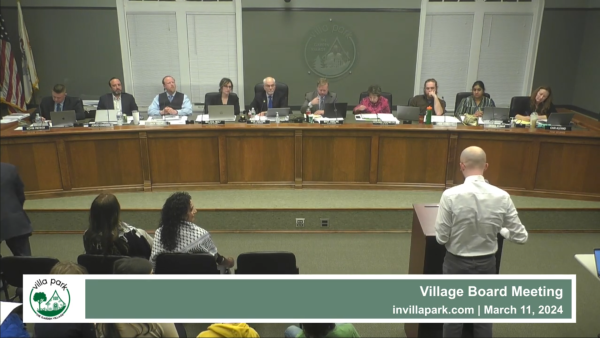
Hamza Ahmed, a COD student and Villa Park resident, spoke at the Feb. 26 Villa Park meeting and described how it is a humanitarian and civic duty to oppose the atrocities people in Gaza are facing.
“I’m embarrassed to say that I come from a country which is funding the genocide of the Palestinian people, as we claim to be the enforcers of justice all over the world,” Ahmed elaborated. “Our tax money is being used to destroy and kill the people inside the open-air prison of Gaza. In the modern day, where we have this information at our fingertips, lack of knowledge is not an excuse for taking a neutral stance. That is why I’m here in front of all of you, asking this board to stand on the right side of history. Call for a cease-fire now.”
Another speaker in the March 11 Villa Park meeting, Keith Larson, described how coming from a Russian-Jewish family informs his support of the cease-fire and rejection of Israel’s actions.
“In Judaism, we are taught the biggest mitzvah, or the great deed of all, is tikkun olam, healing the world. Today as Israel continues to destroy Gaza, and millions of people in Gaza are displaced and starving, the world is in need of great healing,” Larson described. “Despite two–thirds of the U.S. population supporting permanent cease-fire, the federal government offers only minimal aid to Gaza while supplying Israel more bombs to murder Palestinians, and a temporary pause to the genocide, rather than an end to the genocide. We are being ignored. During every moment the government fails to do its duty, Palestinians continue to be starved and murdered. Villa Park cannot single-handedly end this genocide today, but you can raise our voices so that those in D.C. who ignore us have a harder time drowning out our pleas to end this U.S.-funded genocide.”
Speakers ranged from high school students, refugees, church pastors, teachers and parents echoing the importance of dealing with the conflict and its local impacts, whether people with family suffering in Palestine and Israel, or the use of U.S. federal tax funding of Israel’s military.
After twelve speakers in February and another 9 speeches in March, the Villa Park trustees expressed a sympathetic response and passed the resolution.
Most municipal cease-fire resolutions have included three parts, based on the UN Security Council resolutions and the temporary cease-fire from November 2023. These parts are an end to mutual combat by Israel and Hamas in the Gaza Strip; the release of detained Israelis and Palestinians; and the free flow of humanitarian aid to people in Gaza.
The issue of hostage exchange comes to the forefront for citizens in Lombard, Ill. advocating for cease-fire resolutions, as they call for the release of two young Palestinian-American men from Lombard, Ill. Hashem Alagha and Borak Alagha, ages 20 and 18 respectively, were visiting family in Gaza when the conflict began. Both men were slated for evacuation as U.S. citizens, but in February, both were forcefully taken from their family home in Gaza. Later, Israeli forces confirmed they detained the brothers and other family members but did not present a reason for the abductions of the Alaghas, as described in interviews with the Chicago Sun-Times.
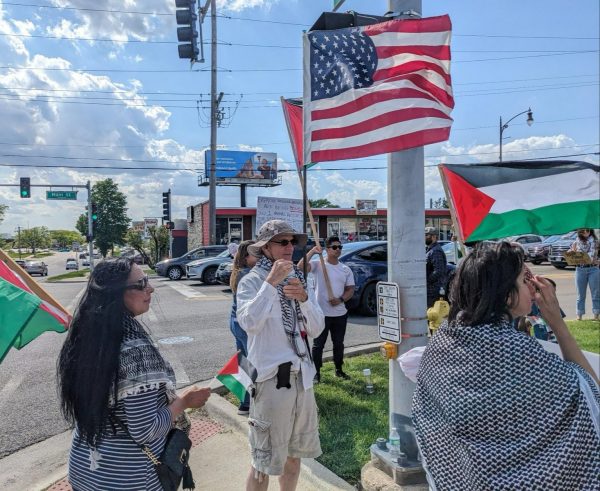
The Alagha family has since intensified calls for the release and safe return of the brothers, through a lawsuit against the U.S. State Department for failing to protect and ensure the return of the brothers to their distressed family waiting in Lombard. Yasmeen Alagha, a Northwest University law student, described how the loss of her cousins compelled her to seek justice through news coverage and legal action.
“I have witnessed videos and pictures of the dead bodies of my family members, people I’m related to, people I met when I last went to Gaza,” Yasmeen Alagha said. “Those are things that allow me to understand that I have an even bigger responsibility to continue to advocate because I need to tell people that this is happening to my family.”
According to the Chicago Sun-Times, there were also five Israeli hostages with connections to Illinois, including a mother and daughter who were released in Oct. 2023 and returned to Evanston, Ill. Of the remaining three hostages with links to Illinois, two identities haven’t been released to the public and one, Hersh Goldberg-Polin, 23, whose family resides in Chicago, Ill. His parents have told the Chicago Sun-Times they are hopeful for his return after seeing an April 24 video where he urged the Israeli government and mediators to organize a hostage exchange.
“The entire region is in so much pain, and we are all desperate to get this deal agreed to by both sides. By Israel and Hamas, so we can end the suffering of all of these innocent people on both sides,” said Rachel Goldberg-Polin, Hersh’s mother, in a June 10 interview with NBC Chicago.
Providing evacuation and safe release of U.S. citizens has been supported by many federal officials, including Illinois Sens. Dick Durbin and Tammy Duckworth with 14 other senators. With important local connections to people in devastating circumstances, many citizens find one solution can be to push for a cease-fire resolution.
As of April 2024, seven Illinois municipalities including Chicago have passed cease-fire resolutions, which are tracked by an article on Medium titled “Illinois Ceasefire Resolution Tracker.” At least 100 other cities around the United States have done the same, according to an Atlantic article from March.
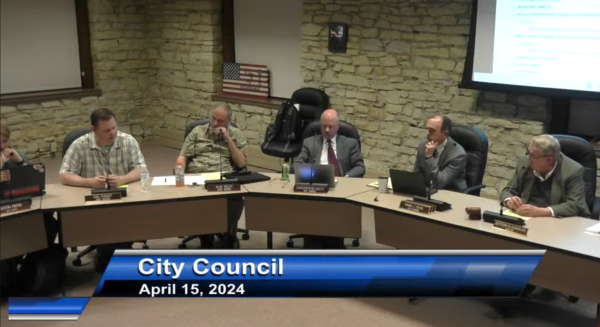
Yet, some challenge the resolutions as a foreign affairs matter unfit for municipal rulings. Advocates respond that laws passed at the local city level ultimately build into state-level bills with the momentum to affect national policy.
Batavia city council member Dan Chanzit described how resolutions could work.
“We have people here that are our neighbors and are hurting. We do need to listen to our neighbors even when it’s unpopular and even when it’s uncomfortable,” Chanzit said. “While I recognize that we are not going to be the ones that cause this to end, the people above us, who do have the power in a representative democracy, absolutely do. So I would absolutely support, as we‘ve done in the past, sending resolutions that will ask the people above us to do their jobs because we have people in our community who are hurting.”
In the past nine months of the war in Gaza, there have been tens of thousands of calls, emails and letters to congressional members and the federal government, as tracked by campaigns from the Council on American-Islamic Relations and the Jewish Voices for Peace.
Within the House of Representatives, H. Res. 786 – Calling for an immediate de-escalation and cease-fire in Israel and occupied Palestine has been co-sponsored by 19 representatives, including three Illinois-based ones. Additionally, 94 members of Congress have expressed support for a cease-fire. The message has certainly reached D.C., but the follow-up to implement actual policies, such as ceasing the funding and sponsorship of Israel’s military actions, is lacking.
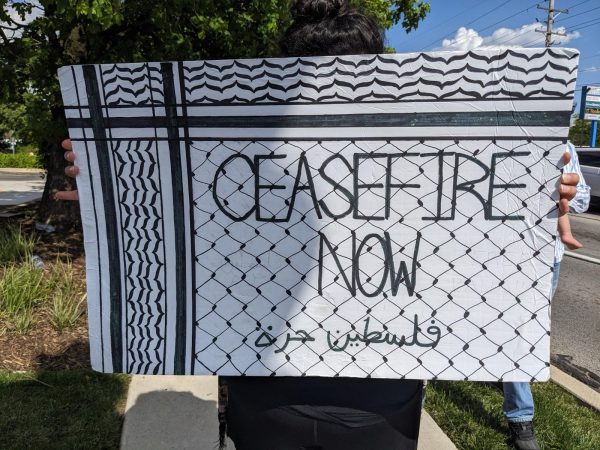
The Batavia City Council resolution that passed on April 15 says a copy of it will be sent to the senators and Representatives Bill Foster and Raja Krishnamoorthi. The council urged other municipalities to do the same, even if it’s a foreign issue, they want to help their Batavian neighbors in distress over the conflict.
This local need is expressed through many resolutions that utilize the resolution to condemn all forms of bigotry against affected groups and foster unity within the community. The Batavia cease-fire resolution states that they want to make an official declaration against “hate crimes perpetrated against our Arab, Jewish, Muslim and Palestinian constituents here in Batavia and around the United States.”
With these many intertwined goals addressing both local concerns about racial discrimination and global concerns about the devastating war in Gaza, community members continue advocating for a cease-fire.



